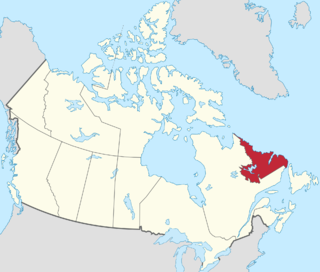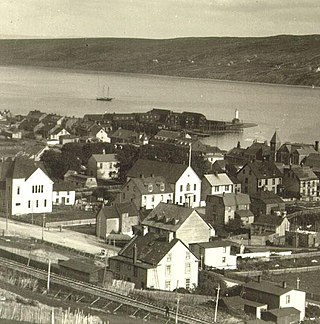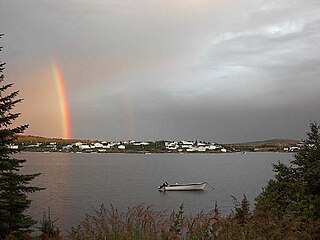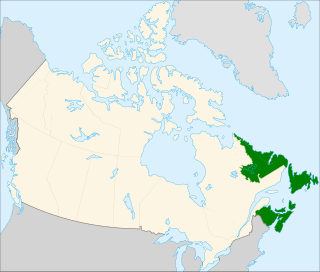Related Research Articles

Newfoundland and Labrador is the easternmost province of Canada, in the country's Atlantic region. The province comprises the island of Newfoundland and the continental region of Labrador, having a total size of 405,212 km2 (156,453 sq mi) As of January 1, 2024, the population of Newfoundland and Labrador was estimated to be 540,552. The island of Newfoundland is home to around 94 per cent of the province's population, with more than half residing in the Avalon Peninsula. Labrador borders the province of Quebec, and the French overseas collectivity of Saint Pierre and Miquelon lies about 20 km (12 mi) west of the Burin Peninsula.

Labrador is a geographic and cultural region within the Canadian province of Newfoundland and Labrador. It is the primarily continental portion of the province and constitutes 71% of the province's area but is home to only 6% of its population. It is separated from the island of Newfoundland by the Strait of Belle Isle. It is the largest and northernmost geographical region in the four Atlantic provinces.

Come By Chance is a town on the isthmus of the Avalon Peninsula in Newfoundland and Labrador, Canada. It is in Division 1 on Placentia Bay.

Marine Atlantic Inc. is an independent Canadian federal Crown corporation which is mandated to operate ferry services between the provinces of Newfoundland and Labrador and Nova Scotia.

Channel-Port aux Basques is a town at the extreme southwestern tip of Newfoundland fronting on the western end of the Cabot Strait. A Marine Atlantic ferry terminal is located in the town which is the primary entry point onto the island of Newfoundland and the western terminus of the Newfoundland and Labrador Route 1 in the province. The town was incorporated in 1945 and its population in the 2021 census was 3,547.

The Newfoundland Time Zone (NT) is a geographic region that keeps time by subtracting 3.5 hours from Coordinated Universal Time (UTC) during standard time, resulting in UTC−03:30; or subtracting 2.5 hours during daylight saving time. The clock time in this zone is based on the mean solar time of the meridian 52 degrees and 30 arcminutes west of the Greenwich Observatory. It is observed solely in the Canadian province of Newfoundland and Labrador. The Newfoundland Time Zone is the only active time zone with a half-hour offset from UTC in the Americas.

Eastern Canada is generally considered to be the region of Canada south of Hudson Bay/Hudson Strait and east of Manitoba, consisting of the following provinces : Newfoundland and Labrador, Nova Scotia, Prince Edward Island, New Brunswick, Quebec and Ontario.

Harbour Grace is a town in Conception Bay on the Avalon Peninsula in the province of Newfoundland and Labrador, Canada. With roots dating back to the 16th century, it is one of the oldest towns in North America.

Newfoundland and Labrador is the easternmost province in Canada. The Strait of Belle Isle separates the province into two geographical regions, Labrador and the island of Newfoundland. The province also includes over seven thousand small islands.

The province of Newfoundland and Labrador covers the period from habitation by Archaic peoples thousands of years ago to the present day.

The Canadian province of Newfoundland and Labrador has a unicameral legislature, the General Assembly composed of the Lieutenant Governor and the House of Assembly, which operates on the Westminster system of government. The executive function of government is formed by the Lieutenant Governor, the premier and his or her cabinet.

Mary's Harbour is a town in the Canadian province of Newfoundland and Labrador. The town had a population of 312 in the Canada 2021 Census, down from 341 in the Canada 2016 Census. It is serviced by Mary's Harbour Airport.

Point Lance is a town in the Canadian province of Newfoundland and Labrador.

College of the North Atlantic is one of the largest post-secondary educational and skills training centres in Atlantic Canada, with a history dating back 50 years. The college has 17 campus locations throughout the province of Newfoundland and Labrador in Canada, various partner universities in China and formerly operated a technical education college for the State of Qatar in the Middle East. The enabling legislation is the College Act.
Black Duck is a local service district and designated place in the Canadian province of Newfoundland and Labrador that is 15 km (9 mi) east of the town of Stephenville. It is characterized by Harry's River, which runs past the community and is an Atlantic salmon fishing river.

Newfoundland is a large island within the Canadian province of Newfoundland and Labrador. It is situated off the eastern coast of the North American mainland and the geographical region of Labrador.

Newfoundland was an English and, later, British colony established in 1610 on the island of Newfoundland, now the province of Newfoundland and Labrador. That followed decades of sporadic English settlement on the island, which was at first seasonal, rather than permanent. It was made a Crown colony in 1824 and a Dominion in 1907. Its economy collapsed during the Great Depression and on 16 February 1934, the Newfoundland legislature agreed to the creation of a six-member Commission of Government to govern the country. In 1949, the country voted to join Canada as the province of Newfoundland.

The Atlantic Bubble was a special travel-restricted area created on July 3, 2020, during the COVID-19 pandemic in Canada. The area was an agreement between the four Atlantic Canadian provinces of New Brunswick, Prince Edward Island, Nova Scotia, and Newfoundland and Labrador which allowed unrestricted travel among provincial residents and restricts travel from Canadians who are residents of outside provinces. Residents wishing to travel to the Atlantic Bubble are subjected to screening and are required to quarantine for 14 days before moving freely throughout the bubble. Individual provinces have specific rules toward travellers from outside of Atlantic Canada. The provinces in the bubble have seen the lowest numbers of COVID-19 compared to other Canadian provinces throughout the pandemic.
References
- ↑ Brian Wright-McLeod (2005). The Encyclopedia of Native Music: More Than a Century of Recordings from Wax Cylinder to the Internet . University of Arizona Press. p. 193. ISBN 978-0-8165-2448-8.